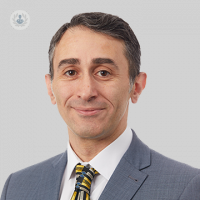The simple facts about shoulder pain
Written by:Our shoulder is a complex joint that allows a wide range of movement whilst maintaining stability. This makes it more prone to various conditions that manifest as pain. To answer basic questions about shoulder pain, we have interviewed experienced consultant trauma and orthopaedic surgeon Mr Omar Haddo.

What are the most common causes of shoulder pain, other than injury?
In general, there are several conditions that present as shoulder pain. Many of these conditions are dependant on age. In the older population, the most common cause of pain is arthritis. In patients between 40 to 60 years old, the two that are most common are a problem with the rotator cuff, such as inflammation or a tear, and a frozen shoulder, which is a painful stiff shoulder. In the younger group, shoulder pain is uncommon without any injury. However, instability can also present as pain, although most commonly as dislocations.
How can patients know if their shoulder pain is serious, and when should they see a doctor?
There are certain conditions that are serious and need urgent attention. Of these, the most urgent are infection and tumours.
Patients will not know what the cause of their pain is. I would therefore recommend you seek advice from your doctors if you have persistent pain, especially if it is deteriorating, if the pain is associate with loss of movement of the arm, and if there are any associated lumps or spreading redness around the joint.
Another group of patients that should seek early advice is those who have had an injury to the shoulder, have attended A&E, where they were assured that there was no injury seen on X-ray, but then continue to suffer with pain and lack of movement afterwards. For these patients, especially those who are still unable to elevate their arm after two to three weeks from injury, I strongly recommend seeing a doctor to rule out a tear in the tendon. The injury may have caused no damage to the bone, but there may be a tear the tendons that cannot be seen in the X-ray.
The other time patients should seek the advice of a doctor, is if they have had the pain for a while and have failed all attempts at getting rid of it, for example, painkillers and physiotherapy or osteopathy.
How do doctors diagnose the cause of shoulder pain?
As with everything really in orthopaedic medicine, the diagnosis starts with taking a history and performing a clinical examination. What the patient tells you, how it happened, was it through injury or spontaneous, where the pain is, do patients have pain at night, and so on.
These all make a big difference and give us good clues to what the cause of the pain is. Then the clinical examination helps us to move that a step further so we can narrow the possible diagnoses to fewer and fewer options. In the end to finally confirm, we may need investigations. Depending on what we think the problem is, these may be an X-ray, an ultrasound, or an MRI scan.
Is there any link between COVID-19 and shoulder pain?
We haven’t seen any link in terms of the link between COVID-19 and shoulder pain, regarding the conditions that can happen in the shoulder like the ones mentioned above. However, few patients are presenting with shoulder pain as a consequence of COVID-19vaccination. This was, however, also seen with other vaccinations in the past.
Should you avoid exercise with shoulder pain?
That's going to depend very much on what the cause of the shoulder pain is. Certain conditions (instability for example) may be treated with a specific form of exercises which will be given by a physiotherapist to strengthen the muscles around the shoulder joint. This is to reestablish the stability of joint. Even some shoulder tendon tears may be treated with exercise.
However, if we're worried about the shoulder tendons tearing even more, then we may restrict certain exercises to avoid further damage. The whole aim is not to stop you from exercising but to be sensible depending on what condition you have. Maintaining movement in the arm and a certain amount of muscle tone and power around it are really important.
So, the simple answer is no, you shouldn't avoid exercise, but you may have to tailor your exercises depending on what the condition is.
What can patients do to relieve shoulder pain at home?
We start with the basics, painkillers as you need them. All types of painkillers will have side effects, so to a certain degree you have to be aware which ones you can or can't take. You should also be aware of what the side effects are, allowing you to recognize them should you develop any. If pain killers alone are not sufficient, then you can seek the advice of a physiotherapist.
In terms of doing exercises yourself, the aim is not to stop exercise but to avoid the ones that aggravate the condition. If there are specific exercises that can make the condition worse, then you should avoid doing those at least in the initial period. As mentioned before, if the pain persists, then that's when you should seek advice to see what the cause is and see if there's any other way to stop the pain.
If you are experiencing shoulder pain or would like more information, you can go to schedule a consultation with Mr Omar Haddo via his Top Doctors profile today.


